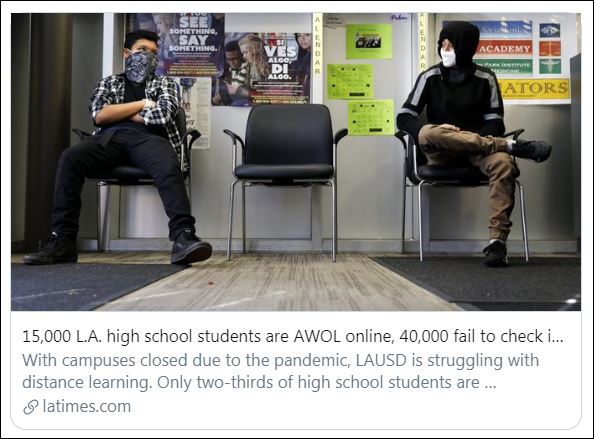Covering COVID-19: A daily update featuring coverage, resources, and ideas to help journalists cover the massive impact of the coronavirus crisis on schools.

THE TOP FIVE
Here are five great education stories about how schools are responding to the COVID-19 crisis:
🏫 Not All Schools Can #KeepLearning — Chicago Tribune/ProPublica [above]
🏫 Coronavirus pushed learning online, but half of US lacks access – USA Today [see also Closed schools turn to TV, PBS, Fox to teach students]
🏫 What Obama’s Stimulus Had for Education That the Coronavirus Package Doesn’t – EdWeek
🏫 Closed colleges are using online proctoring services to monitor students during exams – The Washington Post
🏫 English-Learners May Be Left Behind as Remote Learning Becomes ‘New Normal’ – Education Week 3/17
HOW CAN WE HELP?
In yesterday’s update, I wrote about the inadequate number of education journalists given the size of the COVID crisis and its impact on schools. That was before I started reading about the spread of furloughs and zeroed-out freelance budgets.
It’s a sad, frustrating situation. However, there are several things that education journalism foundations and organizations can do: Support (edit, publish, and pay) freelance journalists whose projects have been stranded; contribute to a beat-specific “furlough fund” for education journalists who are being furloughed or even laid off and need help; encourage education outlets and teams collaborate with each other over coverage priorities so that reporting resources aren’t used in duplicative ways; and — the big vision — create an education-specific national journalism project along the lines of the Kaiser Health News.
The impact of COVID-19 on schools is massive. There aren’t nearly enough education journalists to cover the story. But there are some clear opportunities for leadership here. Is anyone going to step up, beyond what’s already been announced?
HEROES
Let’s take a minute and give shout-outs to some of the standout efforts we’ve been seeing during the COVID-19 crisis. Some of the most obvious examples include Education Week, whose map has become an iconic piece of pandemic journalism, as well as the USA Today team featuring Erin Richards and a band of colleagues, who’ve been putting out a steady stream of strong pieces. To that list I’d add the NPR national education team, whose coverage of the impact of the pandemic on schools has been strong and helpful, and the Seattle Times crew, who led the way into this mess and continue to do great work.
MODEL STORY
Earlier this week, the LA Times published a story (above) that could be a model for local and regional reporters around the country. The piece, 5,000 L.A. high school students are AWOL online, 40,000 fail to check in daily, gives a clear snapshot of what remote learning can look like in the early stages. The data are preliminary and do not include middle or elementary participation figures. And other districts may have no idea what their numbers are. But that’s exactly the point.
TIDBITS
😷 Big thanks to the Seattle Times’ Paige Cornwall for setting up a furlough fund for journalists who are being told to stay home (without pay) because of budget shortfalls at their outlets. Read about it on her Twitter.
😷 Did NPR’s Anya Kamenetz make NPR Morning Edition host Steve Inskeep tear up at the end of this segment about learning lessons from past disruptions — or was that just me? “I’m choosing to find it inspiring,” said Kamenetz. “Education is really our collective work to bring hope and bring energy to the future.”
😷 Help a reporter out? “I’m looking to hear from teachers and professors that are covering some aspect of coronavirus with their students,” tweets NPR’s Kamenetz.
That’s it! You’re all done! See you tomorrow.
ABOUT THE AUTHOR

Alexander Russo
Alexander Russo is founder and editor of The Grade, an award-winning effort to help improve media coverage of education issues. He’s also a Spencer Education Journalism Fellowship winner and a book author. You can reach him at @alexanderrusso.
Visit their website at: https://the-grade.org/

















